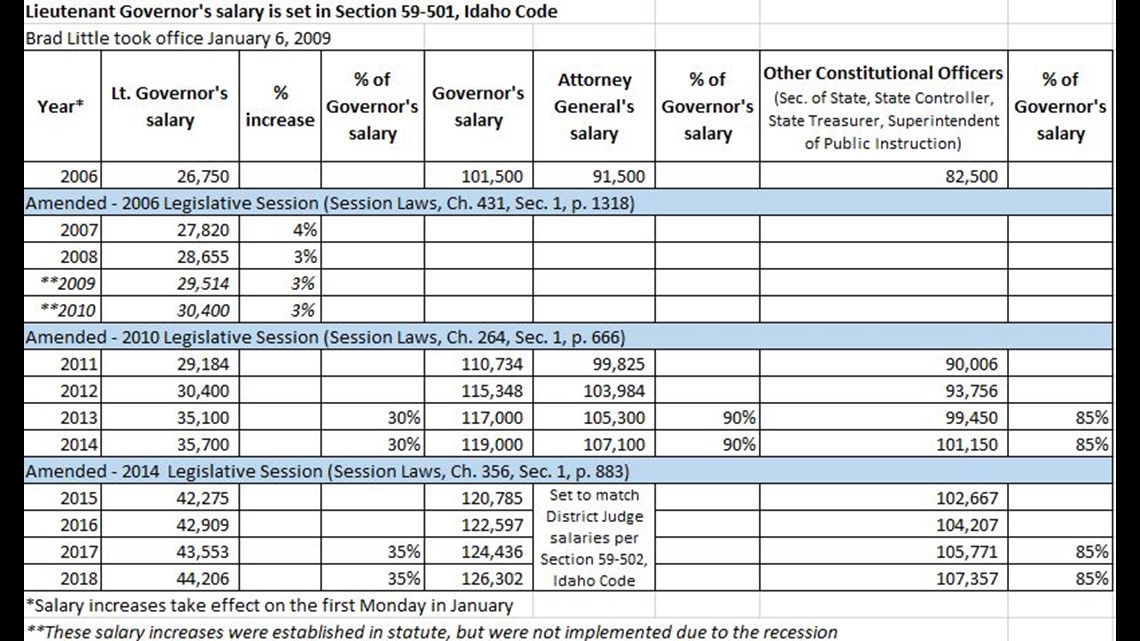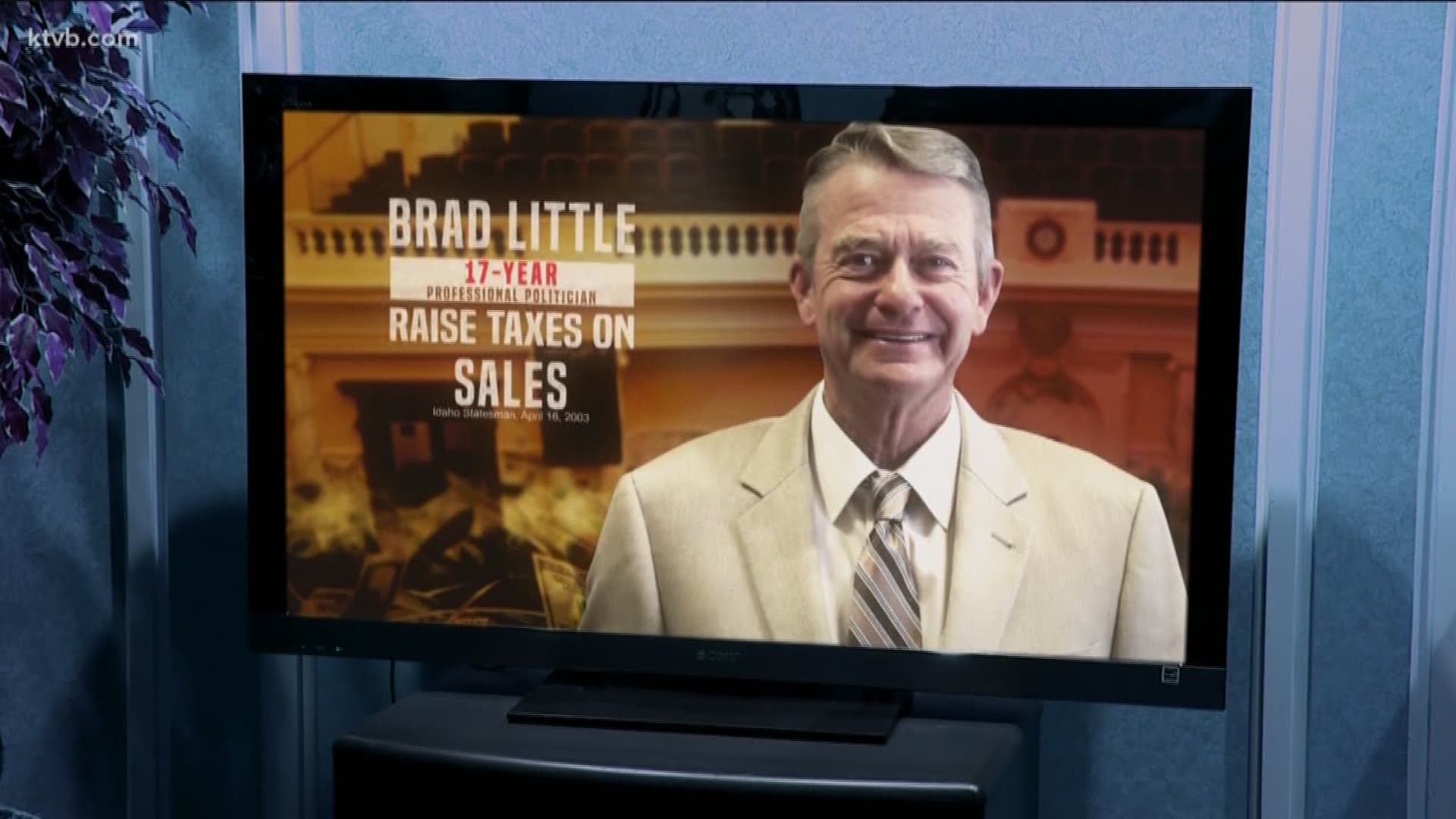BOISE - Things are heating up on the gubernatorial campaign trail, with the May primary a little over a month away.
It seems like every time we switch on our televisions we see a campaign advertisement attacking a candidate or touting accomplishments. So we are looking into those claims to see if they hold any weight.
KTVB's Morgan Boydston set out to verify an ad from Dr. Tommy Ahlquist's campaign going after Lt. Governor Brad Little. A 30-second ad sponsored by Ahlquist's campaign, Tommy for Idaho, hit the airwaves a while ago. We combed through each claim over the last couple days to determine the facts. But, of course, the issues are a lot more complex than snippets in a campaign commercial.
Claim in ad: "Professional politician Brad Little has fought to raise your taxes..."
Let's begin with looking at the claim about gas taxes:
Ahlquist's campaign cites a newspaper article from November 2010 about the transportation funding task force Lt. Gov. Little presided over. The group concluded one of the ways the state should raise money for roads was by hiking gas taxes.
These were recommendations and not official votes. But we can verify this claim is true.
Now to the claim that Little "fought" to raise property taxes:
Ahlquist's campaign cites an April 2006 article referencing a bill Little voted against while he was a state senator.
House bill 421, the property tax- homestead exemption bill, increased the homeowner's exemption from the first $50,000 of a home's value to $75,000. While that gave some homeowners a break, the Idaho State Tax Commission says that tax burden was shifted to other property classes. The other part of the bill tied Idaho to cost of living adjustments determined by a federal index. The legislation passed that session but has been tweaked since then.
By his 'nay' vote on this particular bill, tax experts we spoke with nor KTVB can conclude that means he has fought to raise property taxes. Therefore, this claim is not accurate.
As for the next claim that Brad Little "fought" to raise the sales tax:
Legislative records show Little voted for a bill in 2003 that bumped the state sales tax from 5 percent to 6 percent for the period May 1, 2003 through June 30, 2005.
We can confirm this claim is true.
Claim in ad: "... while helping himself to a 22 percent taxpayer-funded pay raise..."
In the commercial, Ahlquist's team cites a November 2017 article that says, "Little received the highest pay raise for an elected official in 2014".
In doing the math based on data from the Idaho Legislative Services Office, KTVB found they are comparing Little's salary from 2014 - which was $35,700 - to his salary in 2017 - which was $43,553. That's how they arrived at the 22 percent jump.


We can verify the claim is true: it was the biggest pay increase of elected state officers over that time period. But the Lt. Governor, and the other state elected officials, has no control over his salary because it is set by the state legislature.
Claim in ad: "... and a loophole allowing another $10,000 in per diem pay."
Tommy for Idaho is citing a February 2008 Times-News article saying: "For their labor, most state lawmakers last year were paid about $30,000 -- a $16,116 base salary, a $2,200 lump-sum payment "for maintaining the office of the legislator," and $10,004 in per diem. The per diem is a flat $122, tax-free payment for each day they're in session at the Capitol."
Pay is set by the Idaho Citizens' Committee on Legislative Compensation. In the reports available, there is a section called 'Unvouchered Expense Allowances" that lists the following:
1. "Each member of the Legislature who maintains a second residence in Ada County during a regular session shall be paid an unvouchered expense allowance... per day for each day of that regular session." The allowance can and does change some years.
2. "Each member of the Legislature who does not maintain a second residence within fifty (50) miles of the Statehouse in Boise, Idaho, during a regular session shall be paid an unvouchered expense allowance... per day for each day of that regular session." According to this article, that number was set at $49 in 2007 (the same as it was in records we received from 2008).
Even though Little lives in Emmett - within 50 miles of the Capitol - he had another place in Boise for part of his time in the Legislature. His campaign did not know exactly how long he maintained that residence for. Little did take the higher per diem which, according to sources in the state senate, was allowed.
However, legislative records weren't available from 2007 when he took that pay so we can't verify at this time whether the dollar amount in this claim is true.
Brad Little's Campaign Manager Zach Hauge said in a statement to KTVB:
"Facts are stubborn things and it seems that Boise developer Tommy Ahlquist can't handle the facts. Tommy donated thousands of dollars to Democrats and refused to vote for President Trump. But, those are choices he made before he decided to join the Republican party to run for governor. So instead of coming clean about his record, Tommy is now lashing out with false attacks to try and confuse voters in an attempt to save his sinking campaign. We agree with Raul Labrador, it's shameful that Tommy has taken his campaign to such lows."

